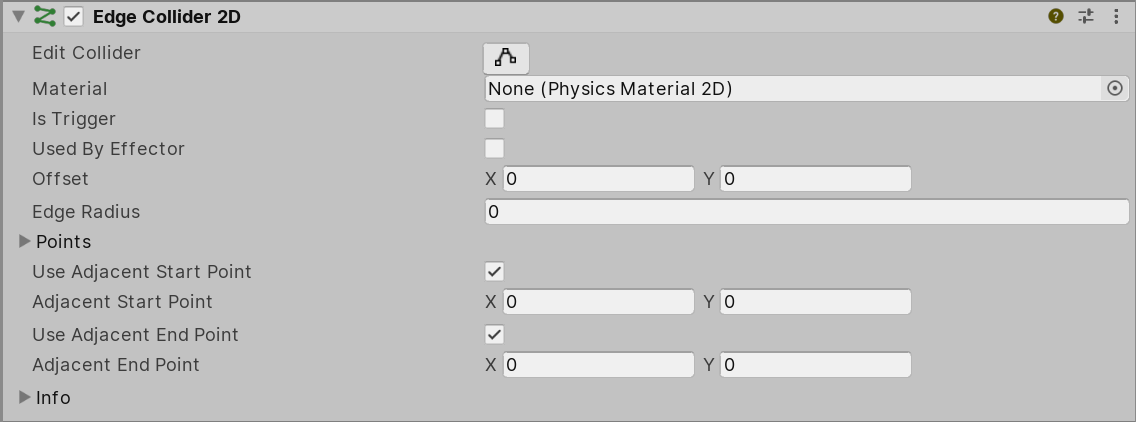Edge Collider 2D
Switch to ScriptingThe Edge ColliderAn invisible shape that is used to handle physical collisions for an object. A collider doesn’t need to be exactly the same shape as the object’s mesh - a rough approximation is often more efficient and indistinguishable in gameplay. More info
See in Glossary 2D component is a Collider that interacts with the 2D physics system. The Collider’s shape is a freeform edge made of line segments that you can adjust to fit the shape of a SpriteA 2D graphic objects. If you are used to working in 3D, Sprites are essentially just standard textures but there are special techniques for combining and managing sprite textures for efficiency and convenience during development. Glossary 2D component is a Collider that interacts with the 2D physics system. The Collider’s shape is a freeform edge made of line segments that you can adjust to fit the shape of a SpriteA 2D graphic objects. If you are used to working in 3D, Sprites are essentially just standard textures but there are special techniques for combining and managing sprite textures for efficiency and convenience during development. More info
See in Glossary or any other shape. The Collider’s start and end points do not need to meet or completely enclose an area to function (unlike the Polygon Collider 2D), and can form a straight line or other single edge shape.

| Property | Function |
|---|---|
| Edit Collider | Select the Edit Polyline button (polyline icon) to make the collider outline editable. See the Collider Shortcuts below for the shortcuts available when Edit Collider is enabled. |
| Material | Select the Physics Material 2DUse to adjust the friction and bounce that occurs between 2D physics objects when they collide More info See in Glossary for this Collider to determine how it interacts with other Colliders. |
| Is Trigger | Enable this property to make the Collider behave as a trigger. |
| Used by Effector | Enable this property to make an attached Effector 2D component use this Collider. |
| Offset X/Y | Set the x/y amounts to offset the Collider geometry. |
| Edge Radius | Set a value that forms a radius around the edge of the Collider. This results in a larger Collider 2D with rounded convex corners. The default value is 0 (no radius). |
| Points | Non-editable information about the complexity of the generated collider. |
| Use Adjacent Start Point | Enable this property to calculate the collisionA collision occurs when the physics engine detects that the colliders of two GameObjects make contact or overlap, when at least one has a Rigidbody component and is in motion. More info See in Glossary response using the Adjacent Start Point to form the collision normal when a collision occurs at the Edge Collider’s start point. |
| Adjacent Start Point X/Y | Set the x/y-coordinates of the Adjacent Start Point. |
| Use Adjacent End Point | Enable this property to calculate the collision response using the Adjacent End Point to form the collision normal when a collision occurs at the Edge Collider’s end point. |
| Adjacent End Point X/Y | Set the x/y-coordinates of the Adjacent End Point. |
Collider Shortcuts (when Edit Collider is enabled)
| Shortcut | Function |
|---|---|
| Hold and drag vertex or edge. | Move the selected vertex and edge to a different position. |
| Click anywhere along an edge. | Create a new vertex by clicking an empty space along the edge. |
| Hold the Ctrl (Windows) or Command (macOS) key and select a vertex or edge. | Deletes the selected vertex or edge. |
EdgeCollider2D